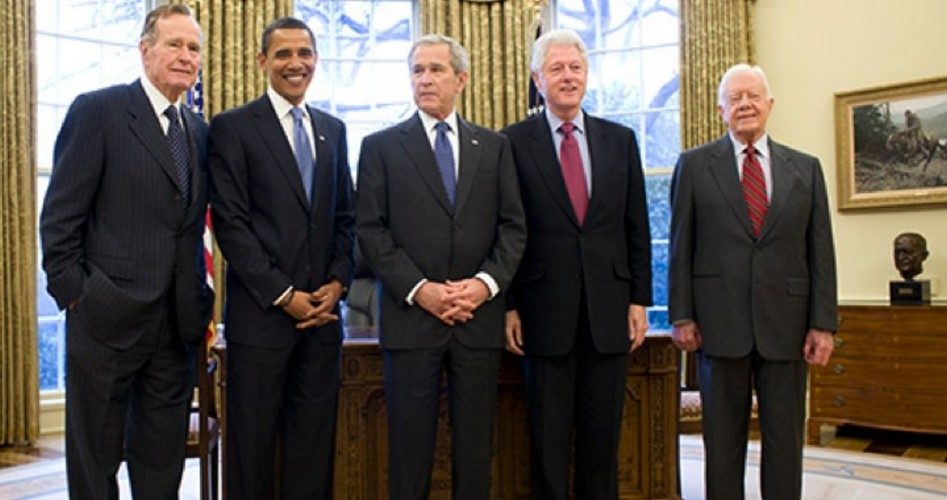
“I think I would choose Trump.”
Political pundits debate the value of political endorsements, but ordinarily an endorsement from a former president of the United States could be expected to count for something. This, however, is an unusual cycle. In the present presidential election campaign, it is not surprising that Hillary Clinton has gained the support of her husband, former President Bill Clinton (second from right). But it is questionable whether it helps or hurts her. And former President George W. Bush’s (center) endorsement of his brother, former Florida Governor Jeb Bush, is much the same. Of course, Jeb’s father, George Herbert Walker Bush (left), endorses his son, too. No surprise.
That leaves only former President Jimmy Carter (right) of the four living ex-presidents who does not have a relative, by blood or marriage, in the present contest.
While Carter will no doubt endorse the Democratic Party nominee, his comments on the Republican battle between Senator Ted Cruz (R-Texas) and New York tycoon Donald Trump, in which he expressed a preference for Trump, might actually make a difference in the New Hampshire primary — and even beyond.
After all, few Republicans depend upon a former Democrat president, especially one who lost 44 states in his 1980 reelection bid, to help them make their decision in the 2016 race.
Yet, Carter announced to the British House of Lords his preference for Trump — at least over the winner of the Iowa Republican primary, Ted Cruz. Carter suggested that his preference for Trump over Cruz might very well “surprise” the British Lords, but he explained his reason. “Trump has proven already that he’s completely malleable. I don’t think he has any fixed opinions that he would really go to the White House and fight for.”
On the other hand, Carter said, “Ted Cruz is not malleable. He has far right-wing policies, in my opinion, that would be pursued aggressively if and when he would become president.”
When informed of Carter’s remarks while campaigning in Nashua, New York, Cruz pounced. “Today — and I’m not making this up — Jimmy Carter endorsed Donald Trump.”
Cruz then paraphrased Carter’s remarks for maximum impact. “Here’s what Jimmy Carter said: The reason is Donald’s views are malleable, he has no core beliefs on anything…. This Cruz guy actually believes this stuff.”
Within hours, the Cruz campaign was airing ads featuring Carter’s support for Trump over the Texas senator. How much effect the Carter “endorsement” of Trump might have on the New Hampshire primary is uncertain, but it certainly cannot help Trump among Republican voters.
On the other hand, Carter told the Lords that he will support whichever Democrat wins the nomination, either Hillary Clinton or Senator Bernie Sanders of Vermont. While Sanders is seeking the nomination of the Democratic Party, he was actually elected to the Senate as a Socialist. Sanders’ status as a socialist did not cause Carter to demonstrate any reluctance to support him. In fact, Carter later told The Mirror that he had “huge admiration” for Sanders.
This is instructive. Carter can support an avowed socialist, if that socialist were the Democratic Party nominee.
Carter’s opposition to Cruz as “far right wing” (one wonders if Carter would consider either Clinton or the socialist Sanders “far left wing”) is not surprising, but many in the Republican Party’s establishment reject Cruz for the same reason as Carter — they do not consider Cruz as “malleable.” And they regard him as “far right wing.”
What is particularly striking is that Carter’s view of Cruz is shared, almost exactly, by former Republican Senator Bob Dole, who was the nominee of the Republican Party in 1996. But Dole was also on the national Republican ticket one time before, in 1976, the same year in which Carter won the presidency. Despite Carter and Dole occupying positions in the tickets of the two parties, in the same election year, Carter the Democrat nominee, and Dole the Republican vice presidential candidate, they have both expressed strong dislike for Cruz — for the identical reason.
“Cruz is so extreme,” Dole said on the TV program Andrea Mitchell Reports. Dole explained his opposition to Cruz, claiming the Texas senator is not a “traditional Republican conservative,” and dismissed Cruz’s “achievements” as only “shutting down the government twice and calling the Republican leader, Mitch McConnell, a liar on the Senate floor.”
Apparently, many Republican voters, unlike Dole, do consider those achievements of a sort. Dole is certainly no “far right wing” Republican. For example, he was the Republican who created the food stamp program, along with the late left-wing Democrat Senator George McGovern of South Dakota. Dole was often referred to by many conservative Republicans back in his day as “the tax collector for the welfare state.”
When asked if he could support Cruz were the Texas senator win the Republican nomination, Dole responded, “I might oversleep that day.”
But Dole was not finished in his condemnation of Cruz. “He uses the word ‘conservative’ more than he ever uses the word ‘Republican.’ So, it would be difficult.”
Yet when Cruz included Dole in his list of Republican presidential candidates who have run unsuccessfully because they did not run as conservatives, one of those other senators in Cruz’s list, Senator John McCain of Arizona, took umbrage. Also appearing on Andrea Mitchell’s program, McCain said, “He [Cruz] can say what he wants to about me, and he can say anything he wants to, I think, about Mitt [Romney], Mitt’s capable of taking it. But when he throws Bob Dole in there, I wonder if he thinks that Bob Dole stood for principle on that hilltop in Italy when he was so gravely wounded and left part of his body there fighting for our country?”
It is highly unlikely that Cruz intended any criticism of Dole for his World War II service. In fact, Cruz was very specific of his criticism of Dole, McCain, and Romney, while speaking to a campaign event in Iowa. “Let me give you an amazing statistic. Do you know if you define as a Reaganite anyone who supported Ronald Reagan in the 1980 primary, do you know that the Republican Party has never once nominated a Reaganite to be president since 1984? Every single nominee since 1984 opposed Ronald Reagan in the 1980 primary.”
The 1988 nominee was George H.W. Bush, who of course did oppose Reagan in 1980, even dismissing his proposed tax-cut plan as “voo-doo economics.” Dole also opposed Reagan in 1980. And of course, George W. Bush was very active in his father’s 1980 effort, which is not surprising.
But when George W. Bush put together his campaign team in time for the 2000 race, he drew upon several individuals who had, indeed, opposed Ronald Reagan, not just in 1980, but in 1976, as well. Bush’s running mate, Dick Cheney, was part of the Ford administration, which Reagan had challenged in the 1976 campaign effort.
Bush’s key campaign operative, Karl Rove, was also a supporter of Ford over Reagan in 1976. After “Tea Party” candidates began to challenge establishment Republicans in primaries, Rove was even a leader in the creation of the Conservative Victory Project, which, despite its name, was formed to counter other organizations that were attempting to defeat establishment Republican candidates.
Mark Levin, a conservative talk show host, was engaged. “As somebody who was active in the Reagan campaign in ’76 and ’80 and served in his administration for eight years. I don’t remember Karl Rove.”
Mitt Romney’s father, George Romney, was one of the establishment Republicans who opposed the insurgent candidacy of Senator Barry Goldwater of Arizona. Mitt cannot be held accountable for his father’s actions, but even after Ronald Reagan was out of office, the younger Romney ran from Reagan’s perceived conservative record. During his debate with Senator Edward Kennedy in their 1994 contest, Romney clearly stated he was no Reaganite. “Look, I was an independent during the time of Reagan-Bush. I’m not trying to return to Reagan-Bush.”
Other Republicans in Congress oppose Cruz for much of the same reasons that bother Jimmy Carter and the Republican establishment figures who have been the party’s nominees. When Cruz celebrated the resignation of House Speaker John Boehner, one of Boehner’s fiercest defenders, Congressman Tom Cole of Oklahoma, expressed disgust on Fox News Sunday. Cole (52 percent on the Freedom Index of The New American — the Freedom Index grades members of Congress on their votes in line with the Constitution) called Cruz’s comments “classless and tasteless and counterproductive.” He went on to say that Cruz had done “nothing” during his time in the Senate.
Regardless of what one thinks of Ted Cruz, his conservative credentials (89 on the Freedom Index of The New American), or his campaign for president, it will be very interesting to see the effect on that campaign such comments as those by Jimmy Carter, Bob Dole, and others. One thing we can certainly conclude for sure. There is really not that much difference between Democrats such as Jimmy Carter, socialists such as Bernie Sanders, and Republicans such as Bob Dole.
And that should be what enrages Republican voters over the next several weeks as they choose their next nominee for president.
Steve Byas is a professor of history at Hillsdale Free Will Baptist College in Moore, Oklahoma. His book, History’s Greatest Libels, examines unfair attacks on historical figures, such as George Washington, Thomas Jefferson, Christopher Columbus, and Joseph McCarthy.

